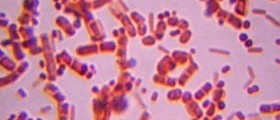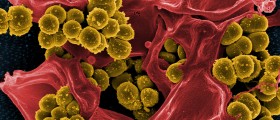
Definition of Clostridium Difficile
There are a lot of people in the world who have heard of Clostridium difficile and know what it is. Clostridium difficile is a certain species of bacteria which is known to cause serious diarrhea and several other intestinal diseases. However, this bacteria basically cause diarrhea when the other bacteria which are located in the gut are all destroyed by antibiotics. Clostridium difficile belongs to Gram-positive group of bacteria.
One of the main reasons why not so many people are familiar with this bacterium is because it is not quite a common one and there is only a small number of people who have Clostridium difficile residing in their gut. It is far more likely that a person will end up with the bacteria in his or her gut by accident.
Clostridium difficile usually ends up in the gut when people ingest the spores of the bacteria during their time in the hospital, nursing homes or some other facility of the same purpose. Once the bacteria are in the colon they will overrun it if the gut flora was all destroyed by some antibiotics. A person will experience diarrhea and bloating if there are too many Clostridium difficile in his or her gut and the bacteria generally grow rapidly if there are not other bacteria around. The main reason why a person will experience this health issue is because the bacteria release certain toxins which cause abdominal painl. It is important to eradicate Clostridium difficile as soon as it occurs because infection can lead to various complications and even life-threatening conditions such as toxic megacolon.
The problem with Clostridium difficile is that the symptoms are pretty much the same as those of the ordinary flu. In addition, the symptoms look the same as disease flare-ups in people who suffer from inflammatory bowel disease associated colitis. However, people should not worry too much because mild cases are easily treated with certain antibiotics. Serious cases of Clostridium difficile are also treatable with oral administration of metronidazole. Even if the treatment is not a successful one, there is another option and that is oral administration of vancomycin.
Signs and Symptoms of Clostridium Difficile
In almost all cases of Clostridium difficile infection the most common symptom is diarrhea. The diarrhea in this case is not a mild but rather severe one and a person suffers from more than three either formed or watery stools in a period of one day. Apart from diarrhea, there are some other signs which occur often. Some of these are recent antibiotic exposure, abdominal pain or colitis, high fever and really bad stool odor.
It is important to go to the hospital as soon as any of these symptoms become apparent in order for the condition to be treated timely and properly. That is the best way for some of the possible complications to be avoided.
Prevention of Clostridium Difficile
There are some steps people may take in order for Clostridium difficile to be prevented. Since the chances are the greatest that a person will get infected in hospitals or nursing homes, the most important step is proper antimicrobial prescribing. All of the patients in the hospitals are exposed to antimicrobials. Not a lot of them are aware of the fact that almost half of all antimicrobial use is considered to be inappropriate. This is one of the reasons people need to pay a lot more attention to antimicrobials.
It is estimated that hospitals represent frequent facilities where Clostridium difficile is contracted, certain infection measures needed to be taken. Wearing gloves is very important when dealing with patients who are infected with bacteria. This is only one of the available measures which are effective against the mentioned infection. Using soap and water to wash the hands is important as well because it will get rid of the spores from the hands which might have been contaminated. However, one should know that alcohol-based hand rubs are not that effective. On the other hand, bleach wipes are quite effective and patients are urged to use them often. The wipes should have at least 0.55% sodium hypochlorite.
Soil-containing potted plants are known to contain the bacteria and can even be a good breading ground so people should avoid having them in offices, rooms and hallways of hospital wards. Statistical Data
According to experts, hydrogen system vapors are excellent for sterilization of rooms and significantly reduce the risk of infection. The risk is 53% lower thanks to hydrogen system vapors.
People should also be aware of the fact that the presence of any of the symptoms has a sensitivity of 86% and a specificity of 45%.
Even though this infection is not a common, one one should pay more attention when staying in a hospital and make sure to avoid contact with other people who are already infected by the bacteria.

















Your thoughts on this
Loading...